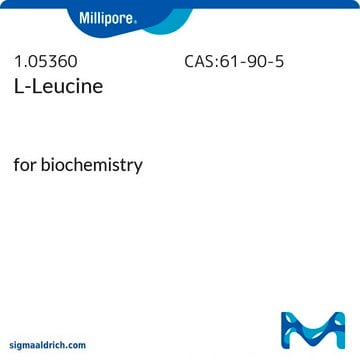If this product has an expiration or retest date, it will be shown on the Certificate of Analysis (COA, CofA). If there is no retest or expiration date listed on the product's COA, we do not have suitable stability data to determine a shelf life. For these products, the only date on the COA will be the release date; a retest, expiration, or use-by-date will not be displayed.
For all products, we recommend handling per defined conditions as printed in our product literature and website product descriptions. We recommend that products should be routinely inspected by customers to ensure they perform as expected.
For products without retest or expiration dates, our standard warranty of 1 year from the date of shipment is applicable.
For more information, please refer to the Product Dating Information document: https://www.sigmaaldrich.com/deepweb/assets/sigmaaldrich/marketing/global/documents/449/386/product-dating-information-mk.pdf
L8912
L-Leucine
98.5-101.0%, suitable for cell culture, non-animal source, meets EP, JP, USP testing specifications
Synonym(s):
(S)-Leucine, (S)-2-Amino-4-methylpentanoic acid
About This Item
Recommended Products
Product Name
L-Leucine, from non-animal source, meets EP, JP, USP testing specifications, suitable for cell culture, 98.5-101.0%
biological source
non-animal source
Agency
USP/NF
meets EP testing specifications
meets JP testing specifications
meets USP testing specifications
Assay
98.5-101.0%
form
powder
optical activity
[α]20/D 14.9 to 16.0°, c = 4 in 6 M HCl
[α]25/D 14.9 to 17.3 °, c = 4 in 6 M HCl
quality
meets EP, JP, USP testing specifications
technique(s)
cell culture | mammalian: suitable
impurities
endotoxin, tested
color
white
mp
>300 °C (lit.)
solubility
1 M HCl: 50 mg/mL
cation traces
As: ≤1 ppm
Fe: ≤10 ppm
NH4+: <0.02%
heavy metals: ≤10 ppm
application(s)
peptide synthesis
pharmaceutical (small molecule)
functional group
amine
carboxylic acid
storage temp.
room temp
SMILES string
CC(C)C[C@H](N)C(O)=O
InChI
1S/C6H13NO2/c1-4(2)3-5(7)6(8)9/h4-5H,3,7H2,1-2H3,(H,8,9)/t5-/m0/s1
InChI key
ROHFNLRQFUQHCH-YFKPBYRVSA-N
Looking for similar products? Visit Product Comparison Guide
General description
Application
Biochem/physiol Actions
Other Notes
Application
comparable product
Storage Class Code
11 - Combustible Solids
WGK
WGK 1
Flash Point(F)
Not applicable
Flash Point(C)
Not applicable
Personal Protective Equipment
Choose from one of the most recent versions:
Certificates of Analysis (COA)
Don't see the Right Version?
If you require a particular version, you can look up a specific certificate by the Lot or Batch number.
Already Own This Product?
Find documentation for the products that you have recently purchased in the Document Library.
Customers Also Viewed
Chromatograms
application for HPLC-
How can I determine the shelf life / expiration / retest date of this product?
1 answer-
Helpful?
-
-
How is shipping temperature determined? And how is it related to the product storage temperature?
1 answer-
Products may be shipped at a different temperature than the recommended long-term storage temperature. If the product quality is sensitive to short-term exposure to conditions other than the recommended long-term storage, it will be shipped on wet or dry-ice. If the product quality is NOT affected by short-term exposure to conditions other than the recommended long-term storage, it will be shipped at ambient temperature. As shipping routes are configured for minimum transit times, shipping at ambient temperature helps control shipping costs for our customers. For more information, please refer to the Storage and Transport Conditions document: https://www.sigmaaldrich.com/deepweb/assets/sigmaaldrich/marketing/global/documents/316/622/storage-transport-conditions-mk.pdf
Helpful?
-
Active Filters
Our team of scientists has experience in all areas of research including Life Science, Material Science, Chemical Synthesis, Chromatography, Analytical and many others.
Contact Technical Service








